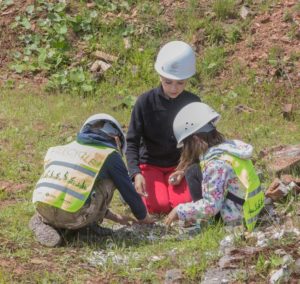Fabulous Finds

Rockwatchers Fossil Hunting. Credits Michael Oates.
The Rockwatch team often get asked to help identify fossils, rocks and minerals and we love to unearth these fabulous finds! You can send us your fabulous find by filling in our Fossil, Rock or Mineral Identification Form. Have a look at some of the fossils that have been found by friends of Rockwatch and finds by Rockwatchers.
Fossil hunting is a great activity you can enjoy as a family or with fellow geology lovers such as on Rockwatch fieldtrips. It’s an inexpensive hobby that gets you outdoors in the fresh air, whilst finding out more about the wonders of the world around us and our past. You can use your detective skills to find and preserve objects and then hone your scientific research skills to investigate and piece together all the information you have that might help you to identify your fossil, rock or mineral.
There’s plenty of help online and in your local library to help you to find out more about fossils, rocks and minerals found in the UK and beyond. A great place to start is the Natural History Museum’s free App that you can use to search areas in England, Scotland and Wales to find out more about common fossils.
Perhaps you’ve found an ammonite or a shark’s tooth whilst on a beach trip, or you’ve unearthed a trilobite or brachiopod whilst rambling near a quarry. There’s so much to discover all around us.
But it’s important to remember to be safe and responsible when hunting for fossils, rocks and minerals. It can be dangerous in some locations such as clifftops, beaches and quarries and so you must take steps to look after yourself and others in your party and not take unnecessary risks.
It’s also really important to take care of the places where you are searching for your fantastic fossils, rocks and mineral finds, not only because this is the right thing to do, but also because there are special laws and regulations we all need to follow to help conserve our countryside for many generations to come. You may also need to ask permission of the land owner to hunt for finds. Generally anyone can collect loose fossils along the British coastline, but you shouldn’t hammer for fossils that might damage an area.
Read the Rockwatch Fieldwork Code for a guide on do’s and don’ts when looking for fossil finds.
